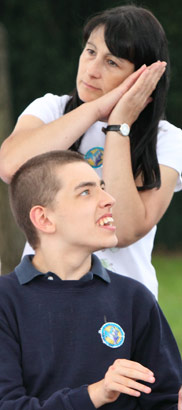
External factors affecting child development and growth can include:
- Family background (expectations of love, support, stability, attitudes
to education); - Culture (different developmental expectations and opportunities);
- Gender;
- Finance (money for food, education resources, suitable housing);
- Exposure to negative environments (eg abuse, chronic anxiety, pollution);
- Health and physical activity.
A baby's brain will develop as expected, shaped by genes and the environment, if:
- The mother's pregnancy and birth has been unproblematic;
- The baby has supportive, attentive and sensitive care from parents/caregivers;
- Parents/caregivers respond attentively to interaction initiated by their child.
Nurturing relationships in the early years promote physical and mental
health and benefit for learning throughout the life cycle.
Tremblay et al, 2011
...particularly in the early years, family life is widely recognized as
one of the most important microsystems, if not the most important microsystem,
for children's cognitive and
social-emotional development.
Siraj-Blatchford et al, 2011
Nurturing family relationships are important for children's development. They need to:
- Be warm;
- Be mutually responsive;
- Use talk in building and maintaining the relationship;
- Recognise the uniqueness and self-determination of the child;
- Facilitate pro-social thinking and behaviour.

Parents can encourage and facilitate academic success through:
- The proximal learning processes they offer their children;
- The opportunities they create for their children to engage in learning processes with others;
- The example they set their children through their own life.
...academic achievement that defies the odds of
disadvantage, requires effort and determination from the children themselves
as well as from the people around them. By having people around them that
believe in them, encourage them, challenge them and support them children
develop a strong sense of self-efficacy...
Siraj-Blatchford
et al, 2011
A child's development can be supported in an educational setting by:
- Building positive relationships;
- Enhancing children's learning;
- Creating rich and appropriate environments and resources;
- Enhancing partnerships with mothers, fathers and carers;
- Taking children's culture into account.
The cultural background of every child should be valued and respected.
Developmental milestones used in the UK may not be relevant for children
with different developmental needs and experiences.
Cultures need to encourage children to build different skill sets and those
skills sets differ vastly from culture to culture. For example, in some
amazonian cultures, the ability to use a machete
is more important than the ability to read. In other cultures, eye contact
is considered rude, and in others play is not valued in the same way.
When assessing children who learn English as an additional language, it
is important to make sure that apparent communication delays are not only
due to a certain lack of familiarity with English.
In the earliest years, health lays the groundwork for long term well-being.
This begins with the future mother's well-being pre-pregnancy. When developing
biological systems are strengthened by positive early experiences, children
are more likely to thrive and grow up to be healthy adults.
Sound health also provides a foundation for the construction of sturdy brain
architecture and the achievement of a broad range of skills and learning
capacities.

Bulman, K. and Savoury, L. (2006) BTEC First Children's Care: Learning
and development. Harlow: Heinemann.
Siraj-Blatchford, I., Mayo, A., Melhuish, E., Taggart, B., Sammons, P. and Sylva, K. (2011) Performing against the odds: developmental trajectories of children in the EPPSE 3-16 study. London: Department for Education.

If you want to find out more about this fascinating area, read the following:
Guavain, M. and Munroe, R.L. (2009) Contributions of societal modernity
to cognitive development: a comparison of four cultures, Child Development,
80 (6), 1628-1642.
Center on the Developing Child.
How can you relate the findings to a child or group of children that you are supporting?